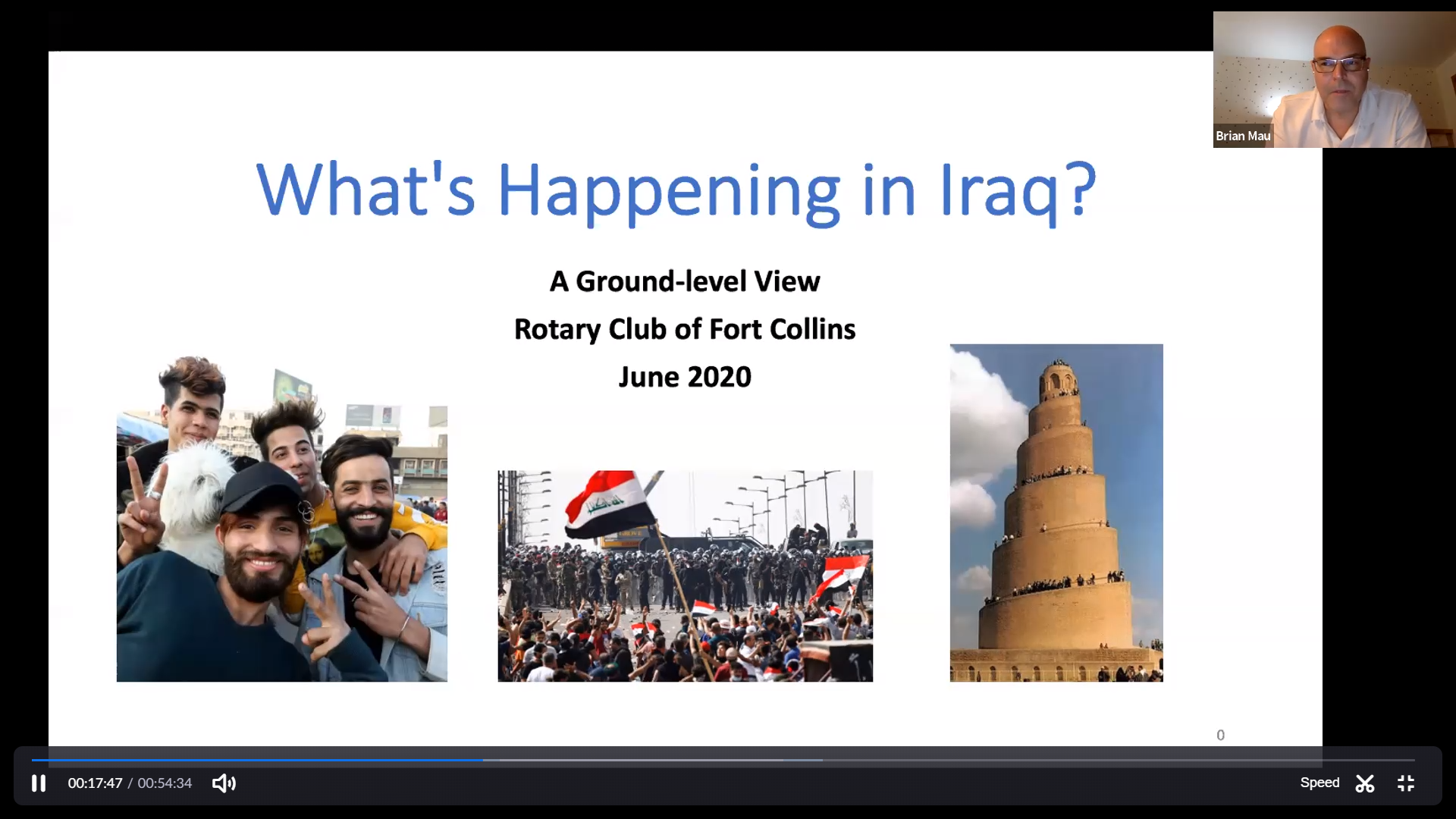 For our meeting of June 17, Brian Mau (United Nations Senior Development Coordination Officer, Strategic Planning & Resident Coordinator’s Office Team Leader in Iraq) gave us an overview of the political, social, economic, and international crises facing Iraq since the US-led invasion of 2003. Although Mr. Mau has only recently taken on his current job, he has spent some seven years in Iraq working at high levels of the UN Office.
For our meeting of June 17, Brian Mau (United Nations Senior Development Coordination Officer, Strategic Planning & Resident Coordinator’s Office Team Leader in Iraq) gave us an overview of the political, social, economic, and international crises facing Iraq since the US-led invasion of 2003. Although Mr. Mau has only recently taken on his current job, he has spent some seven years in Iraq working at high levels of the UN Office. Brian started with a review of the history of Iraq, starting with its creation as a part of the Sykes-Picot agreement at the end of World War I that turned pieces of the old Ottoman Empire into various countries including Iraq. The country, approximately the size and population of California, has populations living together who don’t normally want to be together: ¾ Arabs and ¼ Kurds; 97% Muslim (of whom some 64% are Shia, 31% Sunni).
Iraq has been a bad neighbor in a bad neighborhood (adjacent countries including Syria and Iran). In 1980 – 88, in the aftermath of the Iranian revolution, Iraq attacked Iran with at least the acquiescence of the US government, providing no benefit to either country. Subsequently, Iraq invaded Kuwait (1990-91), ultimately being driven out by a US-led coalition and suffering crippling sanctions. In 2003, another US-led coalition invaded Iraq, occupying the country until 2011; sectarian violence led to hundreds of thousands of deaths. Then, in 2014, the Islamic State (ISIL or ISIS) gained control of approximately half of the country, resulting in some $88 billion in damage before its removal in 2017. The Kurds, the dominant population in the NE part of the country, were sufficiently effective in countering ISIS that they tried to secede from Iraq by referendum; this backfired and the Kurds lost territory.
All of which is background for Iraq’s current problems. In 2019, massive demonstrations against the weak governance, poor economy, and rampant corruption led to the fall of the government. It is only recently that a new government has been formed. Stability of the country, economically, socially, and politically, has been damaged by the proxy war between the US and Iran (including the recent assassination of a top Iranian general while in Iraq), the advent of Covid-19 (exacerbated by mass gatherings and a weak medical system), and the recent oil-price crash (90% of Iraq’s revenue is from oil). External threats include reduction of river flow (major rivers originate in Turkey and Iran), refugees from the Syrian civil war, and Turkish military incursions along the northern border hunting Kurdish PKK “terrorists”. Internal threats arise from long-term effects of the many wars in which the country has participated, including dealing with some 1.5 million internally displaced refugees. The recently installed power-sharing government is too weak to effectively battle either endemic corruption or the Turkish incursions. All this is exacerbated by the demographic time bomb that ½ of the population is under 20 years old and there are few jobs, so these desperate youths are ripe for embracing extremism.
So why should the US care? ISIS is still there and still locally successful and needs to be countered. Iraq is the world’s third largest oil producer so stability helps stabilize the oil industry and counters the influence of Iran. Although its governance is weak, it is the only true democracy in the area, with a free press and many political parties. The huge internal displacement and the demographic time bomb pose threats to that democracy. Finally, there is the philosophy that “you break it, you own it” resulting from the 2003 invasion under false pretenses, the disastrous occupation policies, and the vast sunk costs of some 4400 American deaths as well as vast amounts of US tax-payer dollars. The magnitude of US involvement is indicated by the fact that the US embassy in Baghdad is the largest in the world.
Who is helping in Iraq? The UN has some 25 agencies active in the country; Mr. Mau is responsible for trying to coordinate their actions. The Combined Joint Task Force has some 6350 uniformed military members from 27 nations training Iraqi forces and fighting ISIL. Most Iraqis are strong and resilient but need help from the international community to work through their institutional problems. The end-game strategy is to help the Iraqi government make the necessary changes, including addressing corruption, to stabilize the country.
There have been suggestions in the past to divide the country into three parts with the Kurds in the northeast, the Sunnis in the center, and the Shiites in the south. However, most Iraqis seem to want to keep it together and the young seem to be less focused on the sectarian differences that currently divide the country.